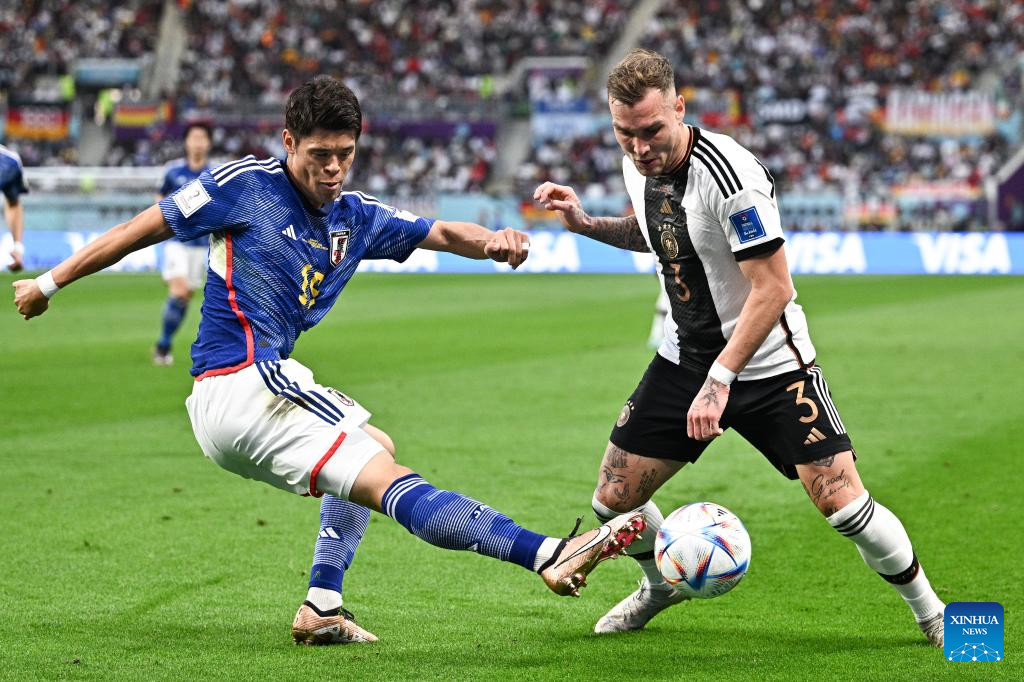Asian upstarts give Chinese fans hope
 0 Comment(s)
0 Comment(s) Print
Print E-mail China Daily, November 30, 2022
E-mail China Daily, November 30, 2022
Stunning soccer behemoths like Argentina and Germany in their group games, Asian teams have been a breath of fresh air at the ongoing FIFA World Cup in Qatar.

For Chinese fans cheering on these underdogs, it's a case of mixed emotions. Each triumph has also been a reminder of their own national team's absence from the tournament. Team China has not qualified for the World Cup finals since a solitary appearance in 2002, and recent form suggests there is a long journey ahead for the squad to return to Asia's elite ranks.
Saudi Arabia sprang the first Asian surprise in Qatar on Nov 22, a 2-1 defeat of Lionel Messi's Argentina. The following day, Japan delivered another 2-1 victory, over European powerhouse Germany. Iran then bounced back from a 6-2 drubbing against England to outplay Wales, led by former Real Madrid forward Gareth Bale.
The shock victories have thrilled success-starved Chinese fans who dubbed the overachieving squads "the light of Asian soccer", while topics related to the wins have become top trending news on Chinese social media.
The upsets prompted many fans to express their frustrations over Team China's struggles.
"After the Japanese team defeated Argentina, everyone congratulated me for the win, as they thought I was a Japanese fan. I watched the match at a fan plaza where fans from all over the world gathered, but there were not many East Asian faces," said Lin Jianxiao, a Chinese internet celebrity who has traveled to Qatar for the World Cup. His vlog of people mistaking him for a Japanese fan went viral on Chinese social media.
"I repeatedly explained to other fans that I'm Chinese, not Japanese. They all congratulated me anyway. But I'm Chinese and our team is not here at the World Cup. It's pretty sad actually. Japan won the game through their perseverance and their strength. They deserve our respect. And for Team China, please keep fighting," Lin added.
Team China's hopes of reaching the finals in Qatar fell apart in the final phase of Asian zone qualifying.
After a series of disappointing defeats and controversies on and off the pitch, Li Tie resigned as head coach. It was announced on Saturday that Li Tie is under investigation for "suspected serious violations of discipline and law". In August, Wang Dengfeng, a former Chinese Football Association vice-president, was placed under investigation over similar allegations.
Li Xiaopeng was appointed as Li Tie's successor in December, but failed to find a quick fix, with most matches highlighting the widening gap between China and Asia's top teams.
"Japan has a good chance to reach the knockout stage at the World Cup. From the qualifiers we played, we can clearly see that Japan and South Korea are no longer at the same level of Team China," Chinese forward Wu Lei told media in a recent online interview.
"There are six Asian teams at the World Cup now, and the Japanese team stands out the most to me. Many of the Japanese players are playing at top European clubs. They have developed in these highly competitive environments."
Thanks to solid youth training systems and healthy domestic leagues, Japan and South Korea now consistently produce players capable of shining in the top European leagues, such as Daichi Kamada, of Eintracht Frankfurt, and Son Heung-min, of Tottenham Hotspur. Among Japan's 26-man roster in Qatar, 20 play overseas.
With the return home this year of Wu Lei from La Liga club Espanyol, Team China no longer has any players in Europe's top leagues.
It is likely to take years for the nation's youth training system to produce more talents of Wu's caliber, while China's professional league system is in dire straits. With the end of the Chinese Super League's big-spending era and the pandemic taking a heavy financial toll, the profile of China's top flight has diminished greatly.
Experts and insiders are urging the Chinese soccer community not to lose faith in the work being done to strengthen the domestic game.
"Our youth training is on the right track, but more hard work is needed," Su Maozhen, a member of Team China's 2002 World Cup squad, told Chinanews.com.
"We need to select more talents who are not just good athletes but also have great soccer IQ and can read the game. We should not just focus on short-term results but on long-term benefits."






Go to Forum >>0 Comment(s)